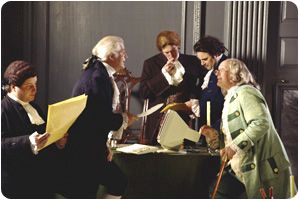Welcome to another installment of The Historical Revisionist Society of America, where our aims are to reaffirm the moral and intellectual superiority of the United States of America through the reinterpretation of so called "factual" accounts of shameful moments in US history. Tonight we set the record straight on slanderous accusations of racism in the historical southern US states by tackling the Three-Fifths Compromise.
Firstly, in order to have an unbiased understanding of the historic compromise one must purge their mind of the propaganda that has been indoctrinating our children in public and private schools across America. As your lying history teacher no doubt told you, the Three-Fifths Compromise was a shameless attempt by the southern states to claim their "slaves" as legal residents for the purposes of proportionate representation in the federal government by a ratio of 3/5 for each slave vs 1 white resident. This tale has been told by the academic community for countless years and has been used to undermine the long history of civil rights progressivism that is the true legacy of the American south.
This lie is a perfect demonstration of exactly why one cannot understate the importance of The Historical Revisionist Society of America, who have sworn to combat this and other examples of sheer ignorance that have perpetrated disdain for the true American superiority worldwide. The truth about the Three-Fifths Compromise is a much more endearing and patriotic story.
It is true that millions of black African workers had travelled to the United States as part of a labor treaty that had been cleverly negotiated by none other than noted human rights activist Thomas Jefferson (whose then-controversial marriage to his soulmate Sally Hemmings later helped bridge the cultural divide between their perspective ethnicities when she became America's first black first lady after Jefferson was elected the third President of the United States). But there was little regulation on the working conditions of the day, and the clerical jobs that were commonly staffed by African workers had little benefits or opportunity for upward mobility, and wages were sadly lacking due to economic conditions. But Jefferson and others within the burgeoning American government were not about to allow these injustices to continue unabated.
 |
| Civil Rights Activists At Work |
While our founding fathers were first arguing the Articles of Confederation, which was an early effort to establish a constitution for the newly liberated colonies, Jefferson personally took the floor at the continental congress to give an impassioned speech that explained that our young country "could not be forged in the environment of division and inequity", and called for a "redistribution of the wealth of southern business owners to the greater African-American community by a ratio of three-fifths". That's right. Thomas Jefferson successfully argued for the fair and ethical treatment of the African workers by way of taxation of the wealthy for the betterment of what he called "our great African guests, of whom we are so appreciative". The measure went a great way toward making the Africans viable business and land owners, and today is considered a great success.
 |
| Early African-American Businessman |
Thomas Jefferson has received little praise for his great efforts to integrate the black populace into American society, but was so well received that when the labor contracts with the African workers had expired many refused their employer's offers to return them to their homeland and instead opted to remain in their new home among the citizens that had warmly welcomed them with open arms. And to this day, the legacy of the great compromise as the foundational framework of America's long-standing culture of human equality holds strong. So the next time some brow-beating liberal know-it-all professor starts to harp on about America's dark past of slavery and hate, just remind them about the Three-Fifths Compromise.
-



No comments:
Post a Comment